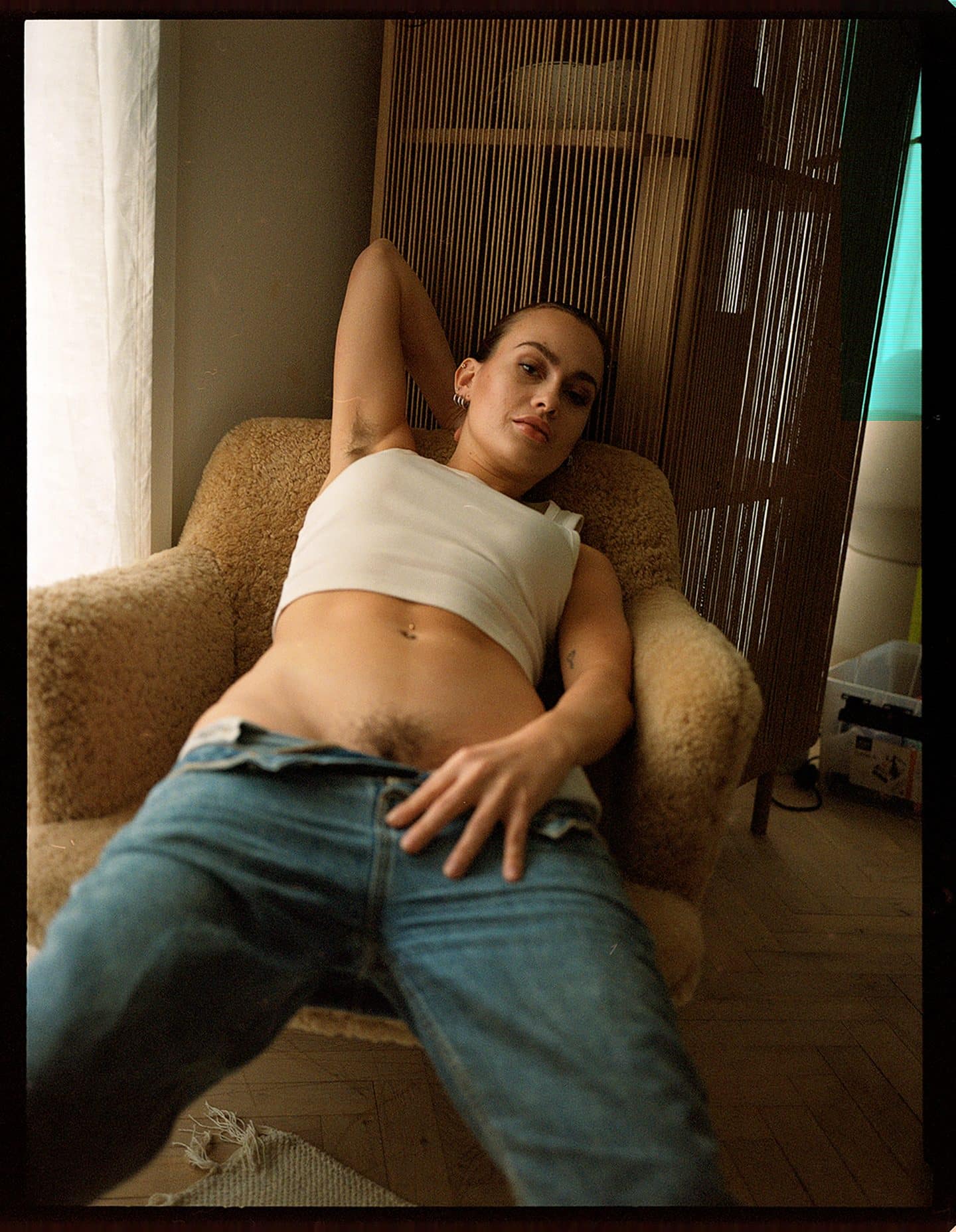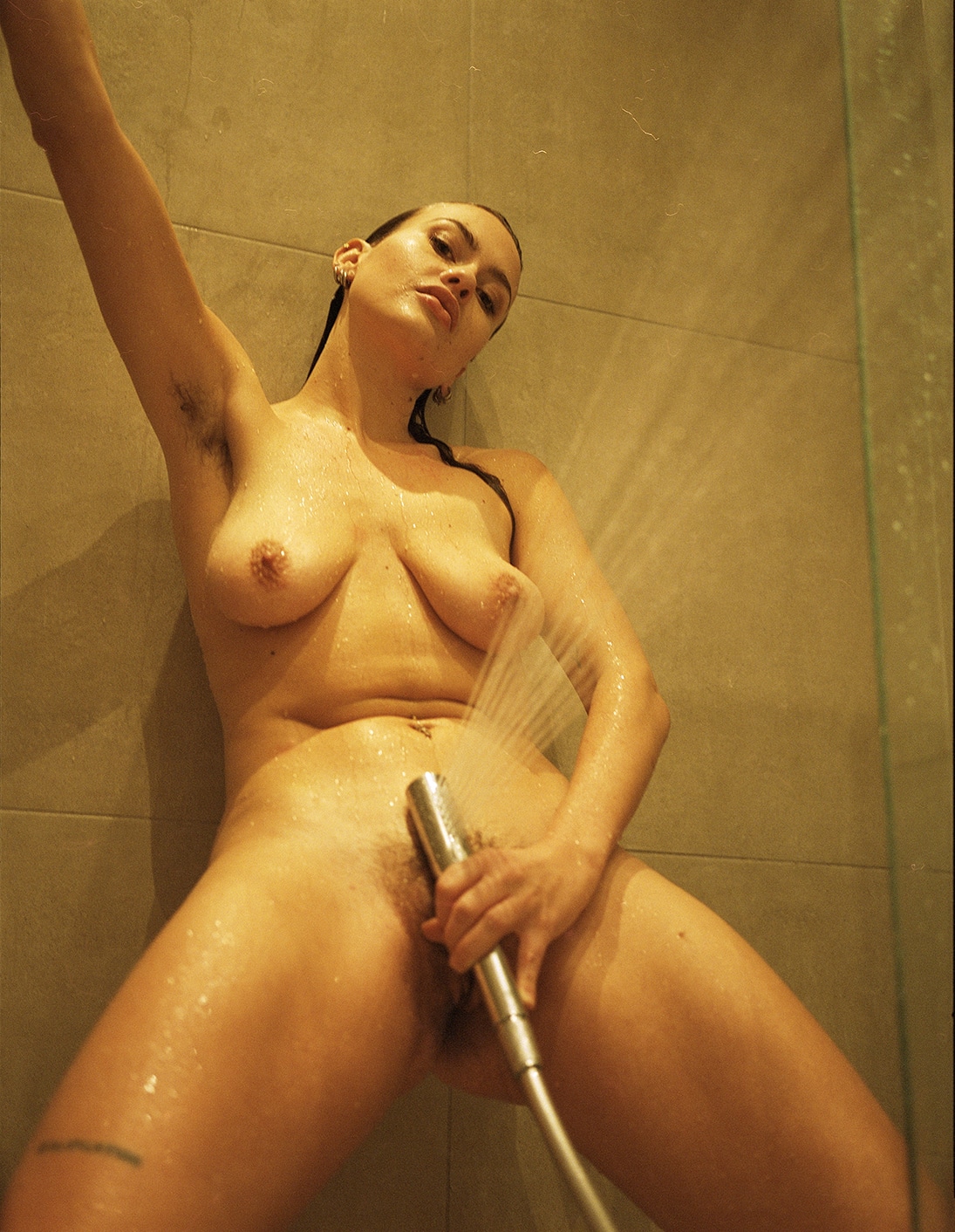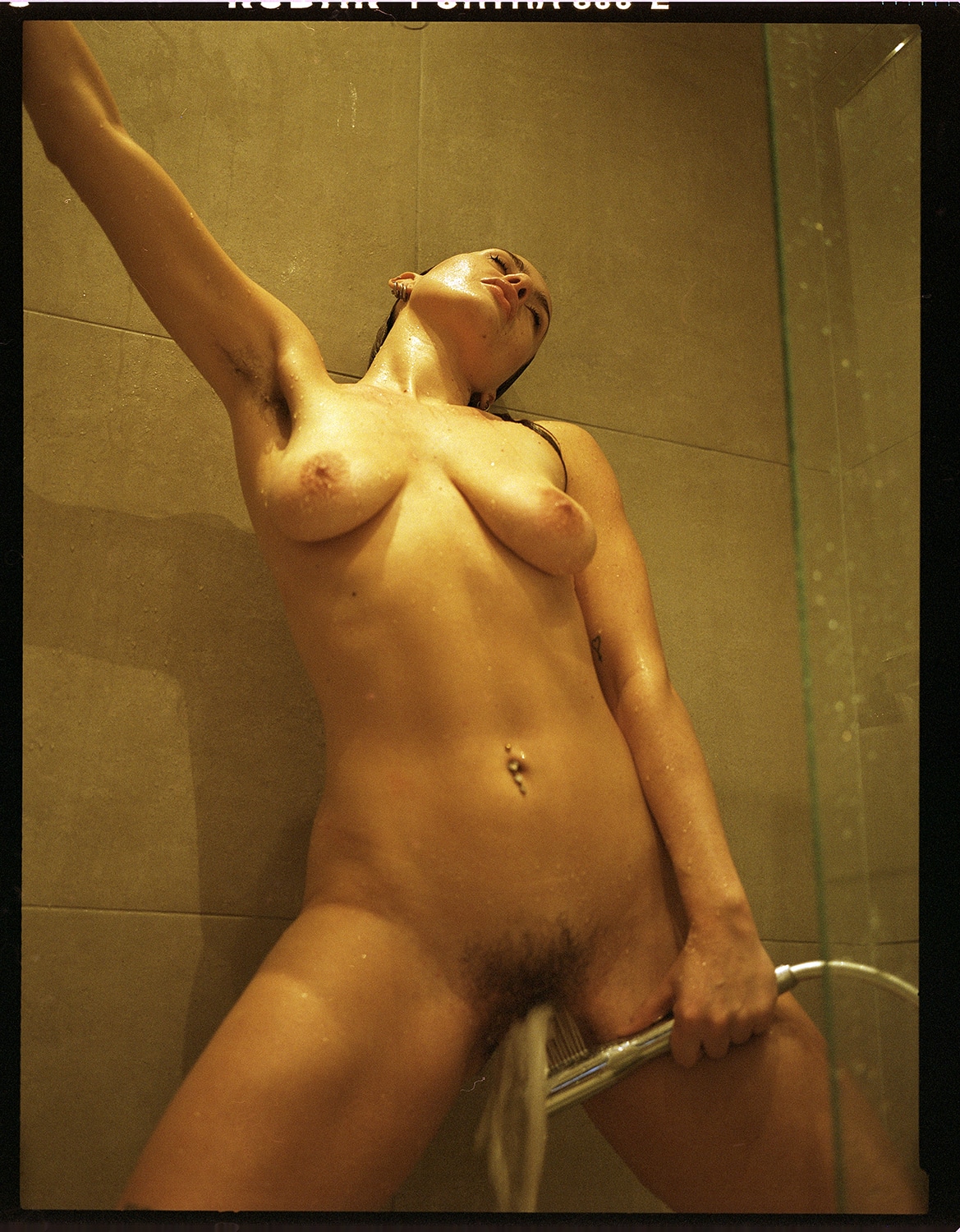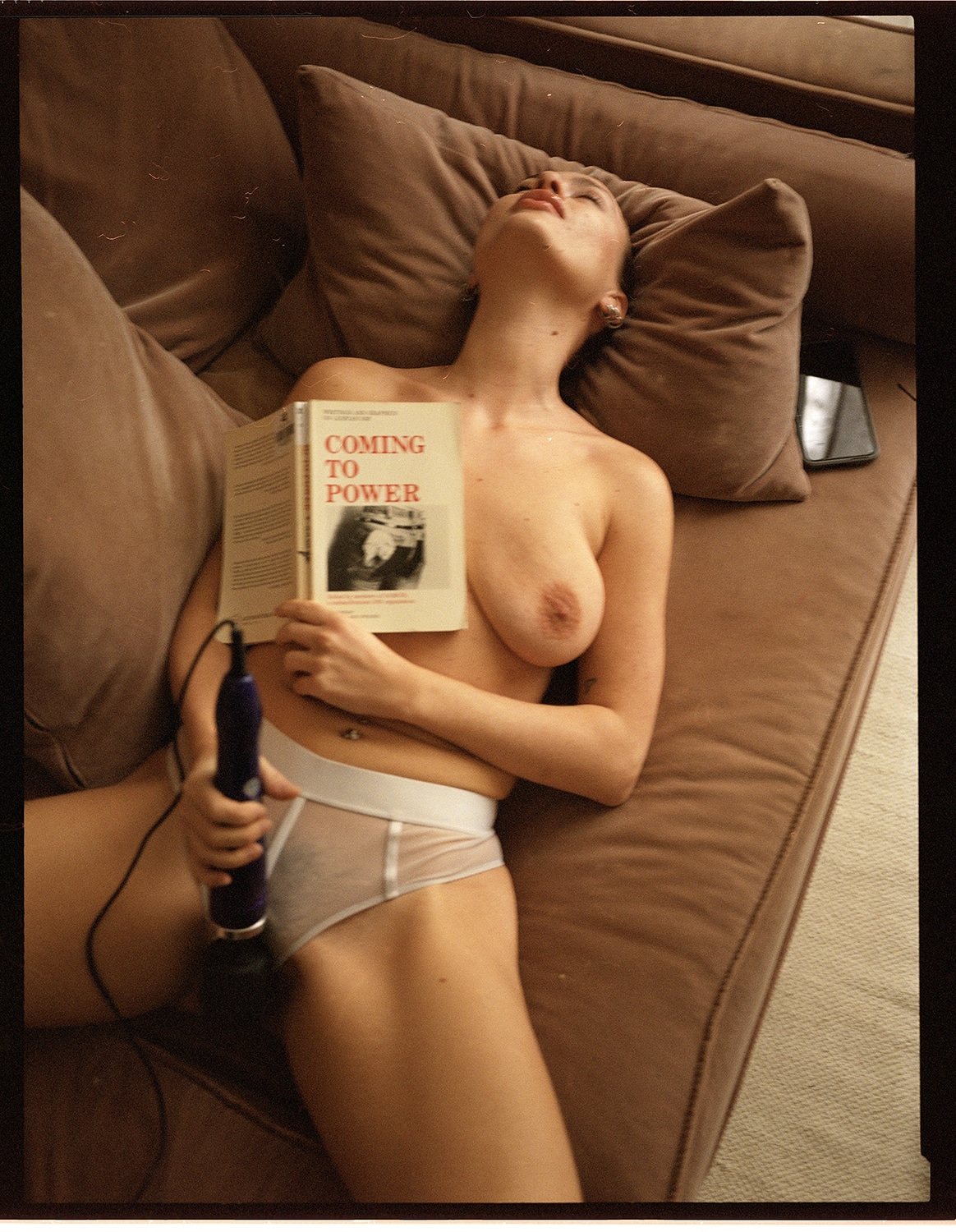
IN CONVERSATION WITH SOPHIE THATCHER
Sophie Thatcher, best known for her role in the critically acclaimed series…
Photography by Jason Renaud; Interview by Louise Garier










In her work, Danish artist Maja Malou Lyse lays bare an emotionally wrought discourse between the online tribes that have gathered around numerous sexual identities. Instead of taking sides, she shows how rapidly the conversation on the topic has diversified: A self-proclaimed agnostic on the matter, she most importantly shows that there isn’t an easy right or wrong – just different perceptions of pleasure.
Internet and social media have offered a platform for a more diverse chorus of voices to discuss sex and sexual identity, and has enabled people to find like-minded friends, whether you may seek sexual liberation or celibacy. However, the discussion is increasingly polarized, with the debate being dominated by one corner that preaches abstinence and another proclaiming for sexual liberation. Here, 27-year old Maja Malou Lyse emerges as an invigorating voice. Describing herself as “sex-critical/sex-neutral” she applies a broad spectrum of practices – including video, performance, columns and sculpture – to make us question and break with societally instilled ideas about sex, gender and identity. Her work encourages us to talk honestly about what we want from sex, pleasure and desire, and highlights the topics’ complexities. Because one thing is sure: The one-size-fits-all model never worked.
Maja Malou Lyse: This question made me think of my favorite sex culture analogy! That sexuality is like Jell-O. You know that wobbly, clear gelatin? Well, in its original form it is fluid and has no shape without a container. But once formed, it becomes fixed and difficult to reshape. See where I’m going with this? We are the Jell-O and society is the container molding us into place. We are shaped by the world around us. And sex is everywhere. We live in a culture where we are constantly being bombarded with sexual information, ideology and imagery. But at the same time, sex is one of the world’s biggest taboos. It’s an absurd paradox! Throughout history, sex and our sexual identities have been dismissed, regulated and demonized – by laws, doctors, media and so forth. A lot has also progressed over time, thank god, but these structures still infiltrate our reality today. Our sexual selves will always be a product of our current time and place.
I grew up on a diet of poor sexual education, mainstream pornography, and visual pop culture. Oh, and the sex advice sections in women’s magazines – I was obsessed with that. And that was basically my nutrition for my sexual upbringing. I never learned about the clitoris or heard of the word consent, but I had memorized the 125 new hot sex positions in the latest Cosmopolitan magazine.
MML: Well, we have yet to find out, don’t we? Nonetheless, it has for sure had a huge impact on our perception of ourselves and our bodies. Because nothing is more IRL than the URL!
During the rise of the internet in the 90s, the cyberfeminist movement believed that on the internet, we would find freedom from social constructs such as gender and race, a utopian belief that was soon dismantled. Two decades later, with the rise of Instagram activism, we believed that this was the moment when we would finally get the freedom to define our own narratives and self images. Turned out, it was just another utopian belief that again was quickly dismantled. I think this is both funny and sad, but nonetheless, really interesting; the internet is both a blessing and a curse!
I do believe that [social media] has been a very important factor in generating community, alternative knowledge and collective resistance. But at the same time, our presence on these apps are being heavily regulated and censored, not only images, but also our use of words. And it’s only getting worse! I’m currently reading Legacy Russell’s book Glitch Feminism, which reminded me of the importance of politicizing bodies online, especially as queer individuals. How we use the internet to explore ourselves and how this can be used as an active tool of self exploration beyond the limitations of society, as well as the limitations of our bodies. That our avatars exist as a glitch or perhaps a sort of virus in the binary system. Reading her thoughts made me regain a sense of o
MML: To me, sex critical – or sex neutral, I use that sometimes, too – goes beyond the binary of “sex negative” and “sex positive.” In the past, sex was something negative, dark, permitted only to make children, something that should be hidden away. We can call this a “sex negative culture.” Now, we are all supposed to always want, love and enjoy sex, and have loads of orgasms! We can call this a “sex positive culture.” And despite its refreshingly positive take on sex, this can be just as harmful and limiting as the previous oppressive sexual moral. Our sexual ideals went from one polarization to another in a very short amount of time. And as much as I think we need an uplifting, positive approach to sex and pleasure, I also believe that liberation can be a form of regulation of its own. In a hyper sex positive culture, we can quickly feel pressured to perform a certain idea of sexuality which should be free and successful. Like it’s a sport to be mastered. I like sex neutral because it holds space for the complexity; the in-between. Not addressing sex as something static, but on a spectrum. It allows sex to be both a good and bad part of our world. To me there is something very freeing about that place of fluidity.
I grew up on a diet of poor sexual education, mainstream pornography, and visual pop culture. Oh, and the sex advice sections in women’s magazines – I was obsessed with that. And that was basically my nutrition for my sexual upbringing. I never learned about the clitoris or heard of the word consent, but I had memorized the 125 new hot sex positions in the latest Cosmopolitan magazine.
MML: Well, it always seems like sexperts just looove sex! And that’s the reason why they are so preoccupied with it. I think I’m preoccupied with sex because I never really liked it. So I think that makes my approach slightly different? I don’t know, you tell me!
Ever since I had my sexual debut at 13, it’s always been an abstract and complicated part of my life and I think that’s what sparked my fire to investigate it. And it seems to resonate with people! In a weird way, there is something very liberating in admitting you are far from liberated.
MML: Well, what can I say, it is always at hand! I think my body is my most useful tool because it’s what I know best. And, still, it is something I simultaneously feel incredibly alienated towards. This is probably why I keep returning back to it and continue to examine these parallel feelings. Being a body is pretty wild!
MML: Humor can break down barriers. It allows us to approach threatening subjects in a non-threatening way. I just think humor is a very effective tool for communicating just about anything that can otherwise seem a little difficult to grasp. Carefully disguised, it can smuggle new ideas into people’s hearts and brains. Additionally, discourse and conversation surrounding bodies and pleasure politics has often existed within academic fields which isn’t very accessible for many people! Approaching these topics more playfully, I think it can speak to a broader audience and resonate with more people. And who doesn’t like having a little smile on their face?
MML: I love vibrators for so many reasons! To approach your question more personally, vibrators are a big part of my sexuality; it’s how I get my orgasms whether I’m partnered or not. I can’t remember the last time I had an orgasm without one, to be honest with you!
I find that quite funny – the thought of a robot being my main squeeze! But I kept coming back to the question of what does it mean to put your pleasure in the hands of a mass-marketed, battery-operated device?! That’s kinda fucked up, you know, evil patriarchal capitalism holding the power of my orgasms! Haha. There is a complexity around this object and that’s what has my attention.
I started studying the cultural history of sex toys, specifically the vibrator. And turns out it has a complex history of its own. Technically, it was invented in order to “treat” the diagnosis hysteria in the 18th century, which means it basically originates from misogyny. Later, in the 1970s, the vibrator became a symbol of the female sexual liberation movement. I think the transformation from being a tool of oppression to a tool of liberation is wildly fascinating! I also think about sex tech and how the sex industry is expanding and changing is really interesting. I like how the dildo has gone from being a fleshy, veiny penis replica to now looking like an undefined, post-human figure in poppy colors, not intending to impersonate human genitals. I like where it’s going!
In a weird way, there is something very liberating in admitting you are far from liberated. Humor can break down barriers. It allows us to approach threatening subjects in a non-threatening way.

Sophie Thatcher, best known for her role in the critically acclaimed series…
Photography by Jason Renaud; Interview by Louise Garier

"We have to create something that has a purpose and is useful. And not forced by the…
Interview Carolin Desiree Becker

Supporting Sydney’s cultural scene: This month’s collaboration reminds us of happy…
Interview by Sina Braetz